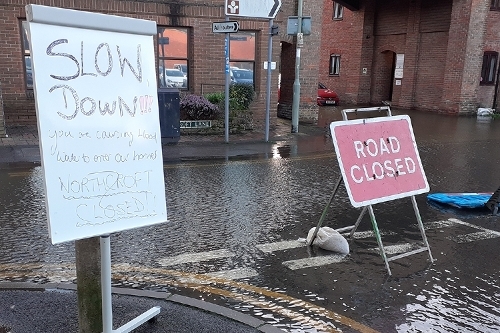Tackling Flooding: Our commitment to protection and preparedness


We understand that flooding has been a significant challenge for many residents. We're working hard to play our part in preventing flooding and to support our communities when it does occur.
To do this, we've enlisted experts to help identify flood risk measures and are collaborating with key partners like the Environment Agency and Thames Water. We're working to clean blockages and are delivering initiatives which could help - from local drainage improvements to large-scale flood mitigation projects.
Are you aware of the flood risks in your area? Being informed and prepared can make a huge difference in how you respond and recover from flooding. Stay proactive, and make sure you know your risks and preparation steps.
The check list below can help with what you can do to prepare:
Step 1: Check your flood risk - visit gov.uk to see if your property is at risk and get advice on how to protect it.
Step 2: Sign up for Emergency Alerts - register for Flood Alerts and Met Office Severe Weather Alerts. Turn on Emergency Alerts on your phone for any national notifications.
Step 3: Pack a grab bag - prepare essentials in case you need to leave quickly. Keep it somewhere handy to grab and go.
Step 4: Create a 'Household Emergency Plan' - list key contacts and important information that your household can follow.
Step 5: Join the Priority Services Register - register for extra support during emergencies if you are eligible.
More information can be found on our website: westberks.gov.uk/flooding
Use our 'Report a Problem' form on our website to report issues such as blocked gullies, flooding, or roads that you think are likely to flood: westberks.gov.uk/reportaproblem
Reporting them early will allow our teams time to fix the problem sooner.
Staying safe and healthy after flooding: essential tips
Flooding can lead to various health issues, including physical injuries, skin or gut infections from contaminated water, and long-term problems like mental health challenges and respiratory issues from mould and damp. Here are some important actions you can take to help you stay safe while cleaning up after a flood:
• Protect yourself: Wear rubber boots, waterproof gloves and protective clothing to avoid direct contact with floodwater.
• Hygiene first: Wash your hands thoroughly with warm water and soap after cleaning or handling flood affected items.
• Take care of your well-being: It's normal to feel tired, anxious, or have trouble sleeping after a flood. Take regular breaks and seek support if needed.
• Safe water use: If water services are disrupted, use bottled water for handwashing.
• Electrical and gas safety: Do not turn on gas or electrical appliances if they have become wet. Have them inspected by a qualified technician first.
• Laundry: Wash clothes worn during cleanup separately from other laundry.
• Handle with care: Watch out for hidden hazards like sharp objects or electrical risks in floodwater.
• Dry out your home: Use heating, dehumidifiers, and ensure good ventilation to help dry out your space.
• Check your insurance: Consult resources like the National Flood Forum and the Property Care Association for advice on flood defence technology and insurance.
Stay safe and seek help if you need it during the recovery process. More detailed information can be found online here: westberks.gov.uk/cleaning-your-home-flooding
Flood Forums: Support and advice from those who know
Flood Forums provide invaluable support from people who have personally experienced flooding or have helped others through it. These forums are designed to offer advice and strengthen resilience for communities, residents and businesses affected by or at risk of flooding.
In West Berkshire, you can connect with these local Flood Forums:
- The Pang Valley Flood Forum
- Lambourn Valley Flood Forum
- Newbury Flood and Drainage Action Group (find them on Facebook)
These forums are great resources for support and practical advice tailored to your specific needs.
More information can be found on the National Flood Forum website: nationalfloodforum.org.uk




